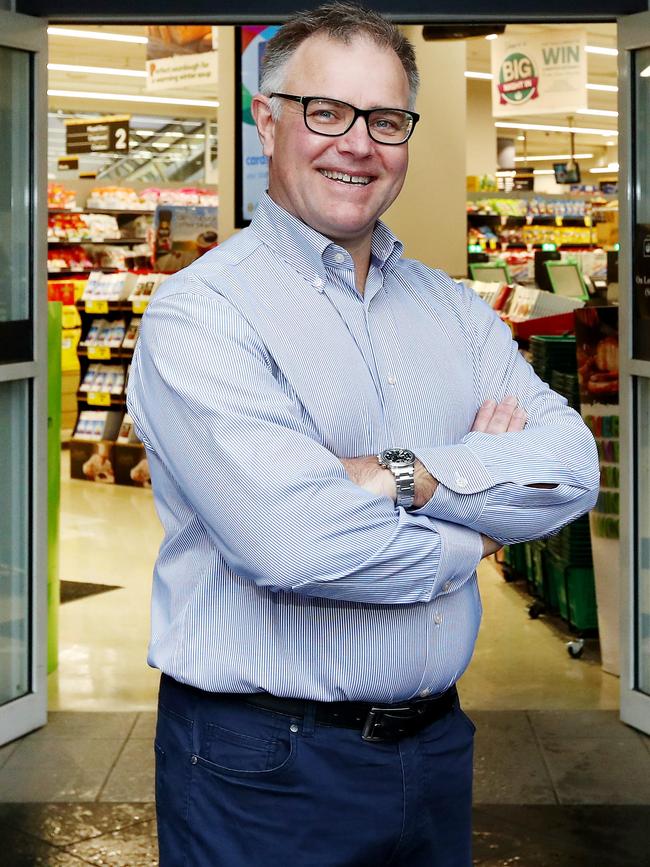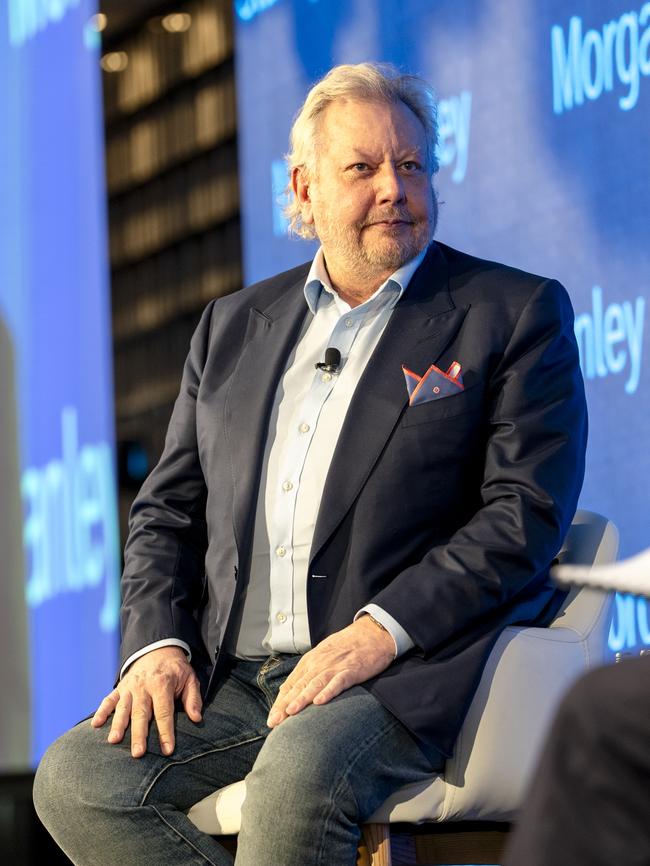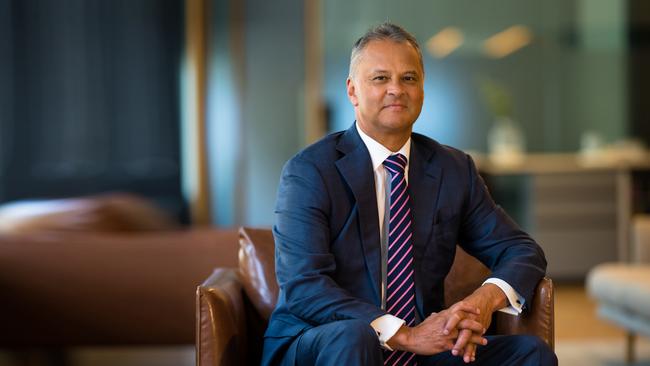Richard White needs to step aside to protect WiseTech
At the very least, the WiseTech boss should take up his board’s suggestion to temporarily vacate his position.
Business
Don't miss out on the headlines from Business. Followed categories will be added to My News.
WiseTech’s 14 per cent share price dive marks the moment investors have finally confronted the key man risk that now represents the technology major’s biggest weakness.
We are getting close to the point of finding out just how much of WiseTech is Richard White, or if the software player has matured to the point that it can stand on its own feet without its eccentric founder.
As CEO and single-biggest shareholder, Richard White too needs to recognise a string of revelations around his personal life have become a major distraction for the $40bn tech company, his staff and customers.

The 69-year-old is now having an outsized negative impact on the fortunes of WiseTech.
At the very least, White should take up his board’s suggestion to temporarily step aside. Failing that he should map out a transition to a non-operational role that allows a new chief executive to step in and drive the business.
It’s clear a split has now started to emerge between the WiseTech board led by Richard Dammery and White on the way the deepening legal problems should be handled.
It comes amid new, but historical allegations the billionaire had engaged in inappropriate behaviour and in 2020 some previous board members had sought assurances from the technology boss around the matter. It also means some longer-serving board members could also be drawn into what they knew about White’s past.
This includes allegations a senior female executive was paid a multimillion-dollar salary, but was not disclosed. (While allegations have been made, there is no suggestion by The Australian of any wrongdoing).

That, and the emergence on Monday of another, separate, historical relationship in which White purchased a property in Sydney’s lower north shore for another businesswoman he was allegedly in a relationship with, before a falling out led to her also taking legal action.
Dammery only took charge in April this year and now confronts the biggest crisis any independent chair could face: taking on the founder and biggest shareholder.
As former Coles-Myer and Woolworths chief legal counsel, Dammery has been involved in some of the nation’s biggest corporate battles, but he needs to show outside investors that include big super funds he is not a hostage to the WiseTech founder.
The first official comments by the board on Monday over the growing two-week scandal confirmed it was now reviewing new allegations. The statement said the board continues to monitor the situation, and take legal advice, but suggested it was not about to jump to conclusions.
“(The board) is conscious of the potential impacts on the company and will carefully evaluate all relevant factors in its assessment.”
This publication last week revealed Dammery had opened the door for White to stand aside while the tech billionaire was focused on a series of allegations emerging from a Federal Court case about White’s personal life. White had responded by saying he wasn’t going anywhere and remained “laser focused” on delivering the company’s strategy.
The initial allegations by Sydney-based Linda Rogan claim White expected sex in return for his business advice. Separate allegations outlining a pattern behaviour has emerged since.
White hasn’t responded to requests for comment, and in his affidavits lodged with the Federal Court he has denied the allegations made against him.
While the WiseTech board has been meeting regularly to discuss the White developments, Dammery has until now regarded the allegations as personal in nature and had preferred for the legal proceedings to play out.
Among the issues now facing Dammery as WiseTech chair will be what options are available to him if the situation with White deteriorates. There’s always the potential for the position of CEO of any company to become untenable. However, in this case the CEO controls more than a third of the company’s share register.
Still, potential for disruption is immense, particularly given White, who built WiseTech from scratch, and has become so intertwined with its strategy.
This means the board needs to show investors it knows exactly what is happening inside WiseTech and has command over the leadership team. Investors too need to grapple with what WiseTech could look without White.
Regardless of the allegations, the pressure is on White to face up to the reputational damage that is starting to set in.
He has to recognise the business of WiseTech is now much bigger than him. For the sake of WiseTech, the billionaire needs to start putting distance between him and the company he built.
Fiscal fight
UniSuper’s chief investment officer John Pearce has the health of the economy at top of mind as he makes allocation calls for the $139bn industry fund. And true to form the long-serving funds boss didn’t hold back when speaking at a global markets forum organised by Commonwealth Bank at the lender’s new campus-style headquarters in Sydney.
The Reserve Bank is trying to cool inflation but fiscal policy – government spending – is making it all the more harder, Pierce told the forum, which was mostly made up of debt investors from local and international funds.
“The reality is, the Australian economy looks pretty sick. If you look at the break-up of the jobs data, it’s just all public sector jobs. It’s not private sector.”

“If you look at GDP per capita, seven of the last eight quarters went backwards. So guess what’s going to happen? The government’s are going to keep spending money.
“And don’t get fooled by the fact that we’ve got a federal (budget) surplus. You’ve got to look at total government sector borrowing requirement, and it’s out of control. Australian government’s spending is completely out of control. So, you know, I don’t see how a central bank can ease when you’ve got a situation where governments are not going to pull back on spending.”
Pearce of course was also taking in state governments, which remain locked on an infrastructure spending blitz and, along with the Commonwealth, are busy issuing bonds to pay for it.
The problem is all the debt issuance is competing in a world where all governments from the US to Europe are on a borrowing binge and at some point the market’s willingness to absorb the issuance will be tested.
According to RBC’s chief economist Su-Lin Ong, total government demand to GDP has risen over the past five years. Outside the Covid-19 era it sits at a historical high of 28.4 per cent, growth to more than half the size of household consumption.
This reflects growing concerns that health and social assistance jobs have been driving much of the jobs growth, which coincides with the introduction of the NDIS.
Still JBWere chief investment officer Sally Auld, who was speaking at the same session, took a different position. After “a pretty soggy first half of the year” the economy is finally starting to pick up momentum.
In things like credit growth, consumer confidence, the jobs numbers, job ads, retail sales, even the NAB Business Survey is showing some signs of life, Auld says.
“It feels we might have passed through an inflection point in the domestic economy,” Auld told the forum.
Earlier, Reserve Bank deputy governor Andrew Hauser told the CBA forum the central bank was “alert and ready to act” on monetary policy, but cash rate moves could respond in either direction. Also, Australia is unlikely to follow other central banks with super-sized cuts, Hauser added.
As Australian shares push record levels, Pearce said he wasn’t yet in the “equities on hold” camp. Apart from the “ridiculous” valuation on CBA shares ($144.45 on Monday), broader valuations “don’t look that stretched” once you take out the tech stocks.
More Coverage
Originally published as Richard White needs to step aside to protect WiseTech





